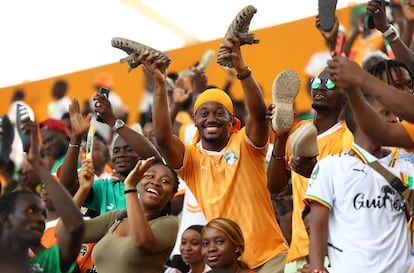Jubilant Ivory Coast fans take to streets to celebrate Africa Cup of Nations win
The Elephants defeated Nigeria 2-1 in Sunday’s final to claim the country’s third title after wins in 1992 and 2015. It set off unbridled celebrations that lasted through the night

Thousands of jubilant Ivory Coast supporters were taking to Abidjan’s city streets on Monday to celebrate the country’s Africa Cup of Nations victory.
Blowing whistles and vuvuzelas, singing and chanting, the supporters poured out of commuter buses near the Félix-Houphouët-Boigny Stadium, where many then ran to arrive in time for the culmination of the team’s victory parade through the city.
The Elephants defeated Nigeria 2-1 in Sunday’s final to claim the country’s third title after wins in 1992 and 2015. It set off unbridled celebrations that lasted through the night in Abidjan and beyond.
“It’s God,” Ivorian worker Issouf Traoré told The Associated Press on Monday, convinced, like many, that there were divine reasons behind the team’s unlikely success after near elimination and the firing of the team coach after the group stage.
Interim coach Emerse Faé became the first in the history of the tournament to win it without having been in charge at the start.
“It’s a fantastic story,” supporter Sanogo Karamoko told the AP. He referred to the long wait since a host country won the biennial tournament. Egypt was the last in 2006.
Fans danced and cheered to loud music in the stadium as they awaited their heroes, while some simply rested while they could as the toll of their evident all-night celebrations took hold.
Supporters also made their way directly to the team’s hotel in the district of Cocody, from where the procession began its slow crawl through a sea of fans on the road.
Some waved Morocco flags to thank the Atlas Lions for keeping the Ivory Coast in the competition. The host nation was facing an early exit until Morocco defeated Zambia in another group to allow Ivory Coast squeeze into the knockout stage as one of the best four third-place finishers in the six groups.
“Without this win from Morocco we wouldn’t have qualified,” said Aminata Sahoné, who wore a Morocco cap and had a Morocco bag on her back. “It would have been finished for us, but they came, the scored, they won. It gave us a chance and some strength, some belief in fighting to make something possible. Well, it paid off.”
Ivory Coast’s progression to the final remained fraught with setbacks as it overcame the firing of its coach and claimed very late come-from-behind wins over defending champion Senegal and Mali in the knockout stage.
Sébastien Haller fired the team into the final with the winning goal against Congo in the semifinals, then scored the winner against Nigeria in the final.
Emotion got to the Borussia Dortmund forward after the game. It’s just over a year since Haller returned after cancer treatment.
“Every game was difficult,” Ivory Coast midfielder Seko Fofana said after the final. “We hope everybody is going to enjoy this moment because it’s not every day.”
Sign up for our weekly newsletter to get more English-language news coverage from EL PAÍS USA Edition
Tu suscripción se está usando en otro dispositivo
¿Quieres añadir otro usuario a tu suscripción?
Si continúas leyendo en este dispositivo, no se podrá leer en el otro.
FlechaTu suscripción se está usando en otro dispositivo y solo puedes acceder a EL PAÍS desde un dispositivo a la vez.
Si quieres compartir tu cuenta, cambia tu suscripción a la modalidad Premium, así podrás añadir otro usuario. Cada uno accederá con su propia cuenta de email, lo que os permitirá personalizar vuestra experiencia en EL PAÍS.
¿Tienes una suscripción de empresa? Accede aquí para contratar más cuentas.
En el caso de no saber quién está usando tu cuenta, te recomendamos cambiar tu contraseña aquí.
Si decides continuar compartiendo tu cuenta, este mensaje se mostrará en tu dispositivo y en el de la otra persona que está usando tu cuenta de forma indefinida, afectando a tu experiencia de lectura. Puedes consultar aquí los términos y condiciones de la suscripción digital.








































